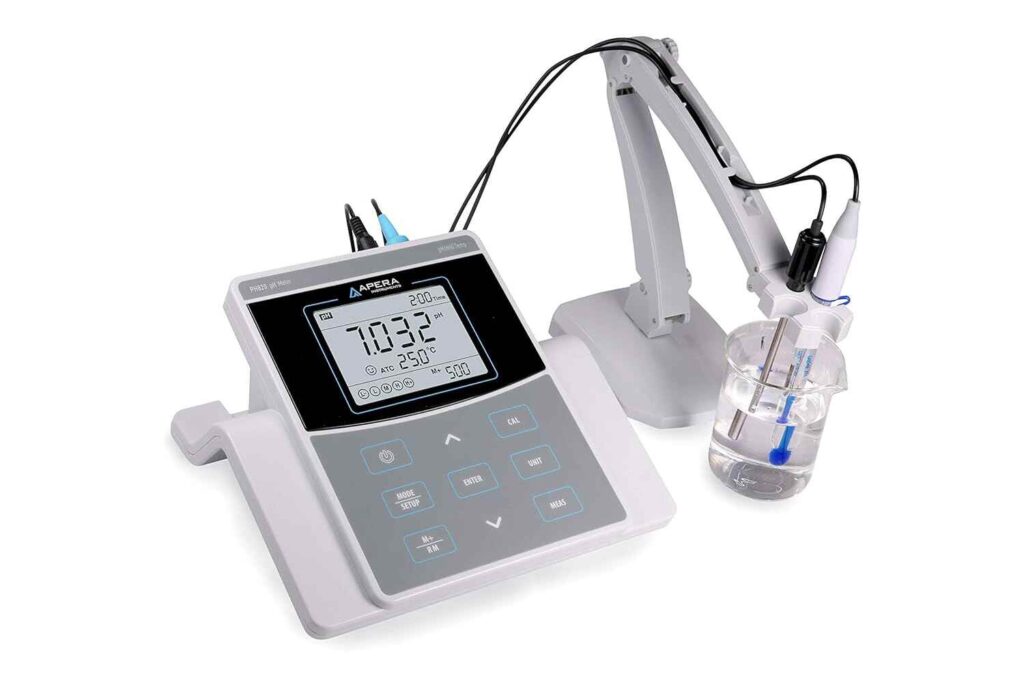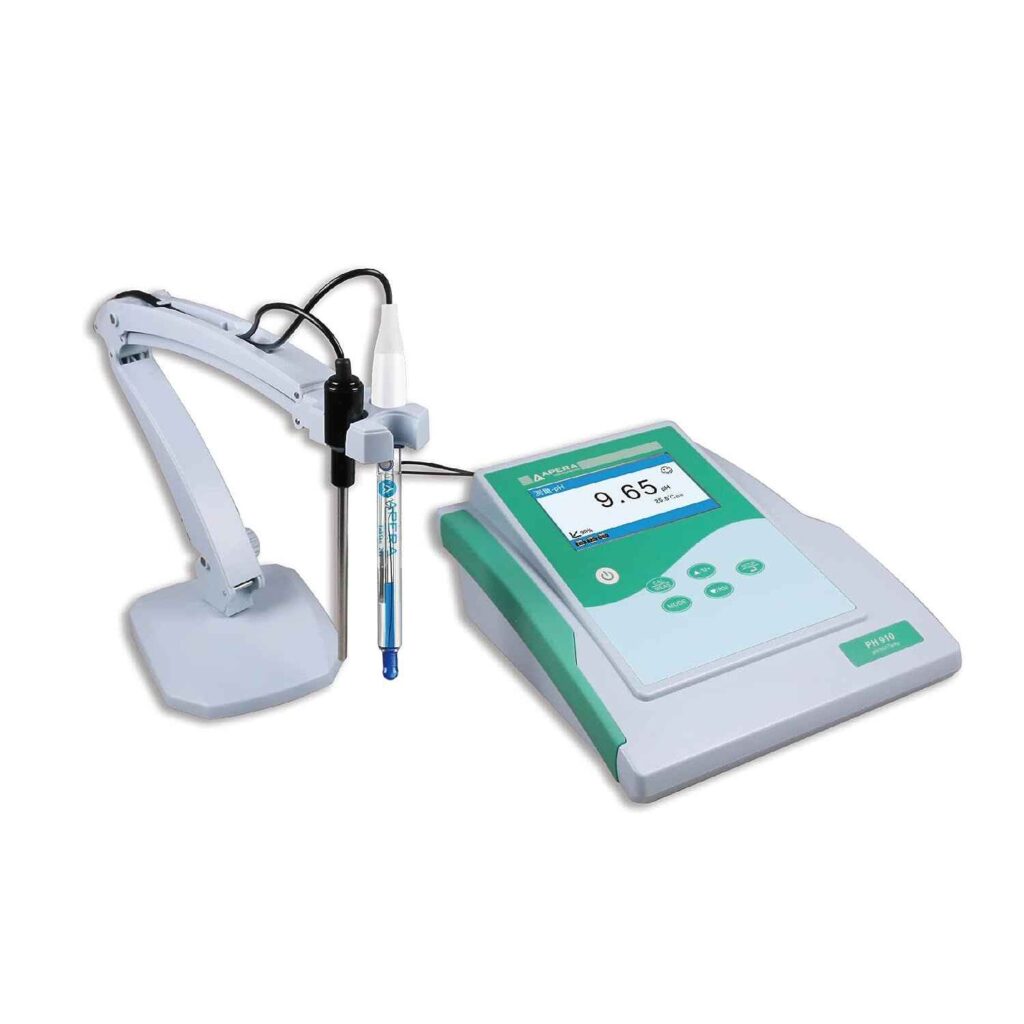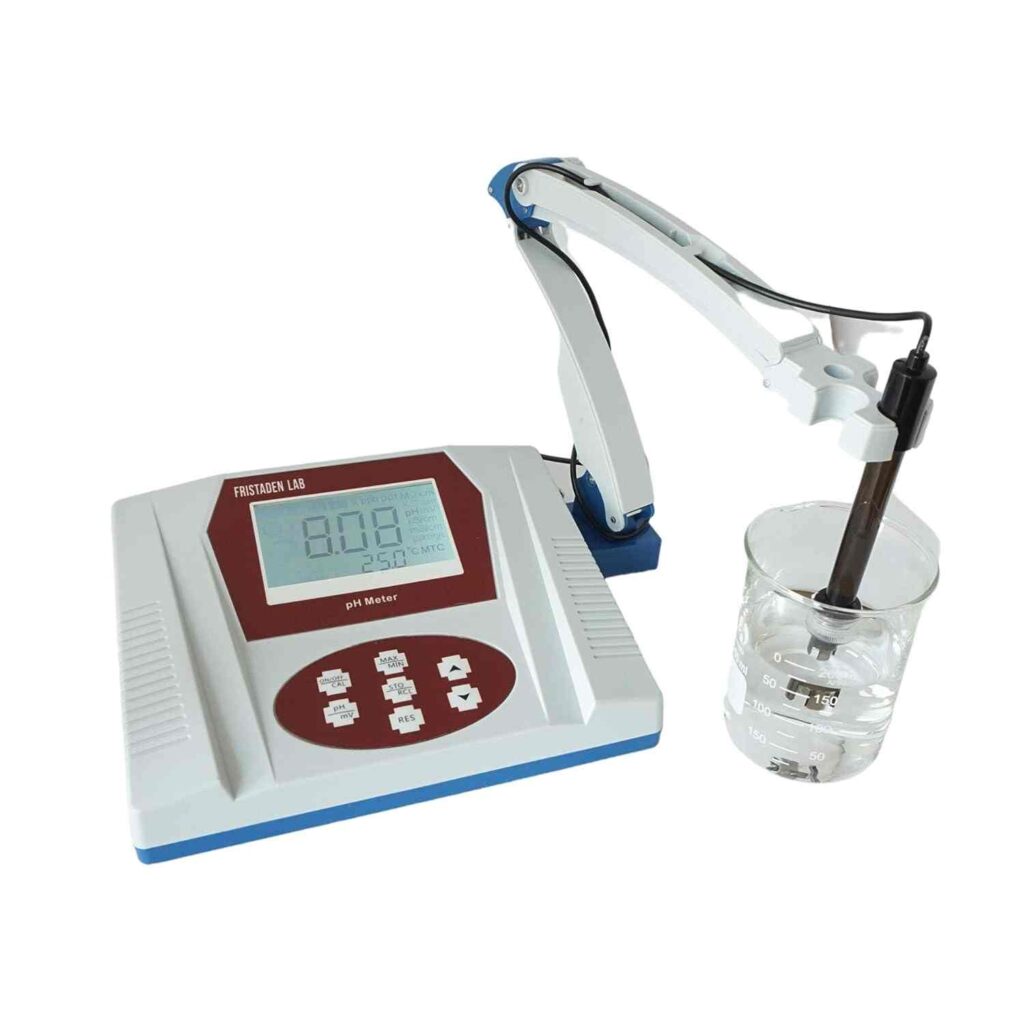The pH meter has become an essential tool in the laboratory setting for various compelling reasons. The meter measures the level of acidity and alkalinity before any chemical reaction for efficient and effective results.
The pH meter is used in different fields of science such as chemistry, biology, environmental science, and food science for better quality control and chemical analysis.
Choosing the best pH meter for lab use can be a daunting task, given the multitude of options available in the market. Thankfully, we’re here to make your decision-making process easier.
The greatest tabletop pH meters made exclusively for laboratory use will be covered in detail in this extensive blog post along with their features.
We’ll also discuss the parameters that should be considered while buying a pH meter.
Let’s get started.
Choosing the best pH meter for lab use
In the laboratory, the pH meter has various applications. It can be used in food industries to measure and control the quality of food, and in pharmaceutical companies and schools to measure the pH of various chemicals.
I have looked at different table-top pH meters along with their specifications and I selected Apera instruments PH820 as the best pH meter for lab use. It offers high data storage and USB connectivity to analyze the data thoroughly.
While selecting a pH meter for your application consider some important parameters that will ease your selection process.
Let’s see these parameters in detail.
a. Accuracy
The first factor is how accurate the pH meter is. The accuracy in the pH meter means how close the measured pH value is to the actual pH value of the solution being tested.
Accuracy is measured in plus and minus (±). Most table-top pH testers have an accuracy of ± 0.01pH or ± 0.001pH which means the measured value can deviate from the actual value by 0.01pH of 0.001pH.
Look for a pH meter that offers high accuracy so that you can measure pH levels without any errors.
b. PH range
The pH range refers to the range of pH values that a pH meter measures and tells us about the acidity or alkalinity. In other words, it is the range of pH levels within which a reliable reading from a pH meter can be obtained.
The majority of pH meters have a pH range from 0 to 14 pH but some of them also offer a range of more than 14. The meter with a pH range from 0 to 14 is considered enough for most of the applications.
c. Resolution
The resolution of the pH meter is an important factor. It means that the smallest increment or change in pH that the meter can detect and display.
Resolution is typically expressed in pH units and can vary from one pH meter to another. The pH meter with a resolution of 0.1 to 0.001pH is suitable for scientific research, quality control, and experiments.
The user can precisely detect even the smallest pH changes in a solution at this level of resolution.
d. Electrode type
Electrode type refers to the type of electrode used in the pH meter. It is one crucial component of the pH meter as it is responsible for measuring the pH level of a substance.
The glass electrode is one of the most common types of electrode used in the pH meter. Glass electrodes are suitable for everyday laboratory use and ideal for a variety of pH tests.
When purchasing a pH meter, it’s important to take into consideration the type of electrode being used.
e. Temperature compensation
Temperature compensation means how a pH meter adjusts the reading according to the solution temperature.
Temperature compensation feature is important you must take this option into account while selecting any pH meter.
Almost all pH meter has automatic temperature compensation feature which allows them to change the measurement according to solution temperature as pH values are sensitive to the temperature.
f. Calibration
Calibration in a pH meter is the process of adjusting the instrument to ensure that it provides accurate and reliable pH measurements.
The calibration process involves comparing the pH meter’s readings to known standard solutions with precisely known pH values.
Different points of calibration are offered by different pH meters. Select a pH meter that offers easy and accurate calibration.
g. Data storage and connectivity
Some pH meters allow you to store your pH measurement and also offer to feed this stored information into the computer through USB connectivity for future use for data analysis documentation and reporting.
The feature of data storage and connectivity is essential and pH meters must have it especially when a meter is used in the laboratory. Look for a pH meter that offers data storage of different pH measurements.
h. Display
A clear and readable display is needed for a pH meter. In some pH meters, the LCD simultaneously shows the temperature and the pH reading.
Some pH meters additionally have an analog display with a needle that shows the pH level that was measured.
Most people prefer digital pH meters because they represent the pH value in numeric which is easy to read and reliable.
List of top pH indicators for lab use
In this section, we’ll discuss some good pH meters for lab use and will also explain the different essential features of these pH meters.
1. Our Selected: Apera Instruments PH820
Apera Instruments is a company that is famous for designing and developing different analysis sensors and devices. Our selected Apera Instruments PH820 (Amazon link) is a table-top pH meter with high resolution and data storage features.

The Good
Offers a broad range of pH for different applications: The Apera PH820 measures the pH range from -2.00 to 19.99 ph. This makes it a versatile pH meter for different laboratory applications.
High accuracy and resolution for reliable measurements: The pH meter offers high accuracy and resolution for both temperature and pH level measurements. The pH meter has a resolution of 0.001pH and an accuracy of ± 0.002pH for pH measurement. For temperature measurement, a resolution of 0.1°C and an accuracy of ± 0.4°C is provided by PH820.
Adjust pH reading according to temperature: This pH meter also has an automatic temperature compensation feature which means it will adjust the reading according to the temperature of the solution as the pH value is sensitive to temperature. Temperature compensation ranges from 0 to 100°C (32 to 212°F)
Provide easy auto calibration: It offers 1 to 5-point easy auto-calibration (7. 00, 4. 00, 10. 01, 1. 68, and 12. 45). The pH meter indicates when it needs to recalibrate and calibrate record function is also available.
For future use offers data storage and connectivity: For using data in the future a data record feature is also offered by Apera PH820. You can store up to 500 groups of data and also support USB data output and PC software connectivity.
Large readable LCD: The meter has an LCD. The pH and temperature are shown simultaneously on the large, clear LCD, along with icons denoting steady readings as well as finished calibrations.
Offer self-diagnosis function to fix the problem: The Self-Diagnosis function assists you in locating and resolving typical calibration issues, and it also allows you to keep track of the pH electrode’s health by providing slope data between two calibration points.
Other useful features: This pH meter has an auto power-off feature means it will turn off after several min without any use. You can also replace the electrode if it is contaminated. It has built-in IP54 water-resistance specifications.
The Bad
Although this tabletop pH meter has all the desirable high-quality features, there is also a drawback. Since the problems are minor, they won’t have any effect on how they perform.
- The Apera Instruments PH820 offers a replaceable electrode feature but it doesn’t give you the option to refill the electrode if you want to change the filling for a specialized application.
Some people may not require these features so apart from this pH meter is high-quality and provides precise measurements.
The downright ugly
The only truly unattractive feature of this pH meter is that it complies with IP57 standards. This means the product will be safe from a limited amount of dust or dirt and water spray so if it is temporary or continuous immersion in water its functionality will be affected.
2. Also Great: Apera Instruments PH910
Apera Instruments has been offering a variety of water analysis sensors and instruments for many years. The tabletop Apera PH910 pH meter is intended for laboratory-grade pH measurement of common water solutions.

Important features:
- The pH meter offers to measure the pH value from 0 to 14ph which is suitable for many applications.
- It has an accuracy of ±0.01ph for pH measurement and a temperature accuracy is ±0.9°F. This means that the pH meter can move from its actual value of pH by 0.01 unit.
- The resolution of the pH meter for pH level is 0.01ph and for temperature is 0.1°F and also has a refillable glass electrode.
- The meter has a temperature compensation feature and offers temperature compensation for temperature ranges from 32 to 212°F (0 to 100°C).
- It allows you to store data up to 200 sets auto or manually. Numberings, dates, time, measurement values, units, and temperature can be stored.
- It offers easy calibration and 1 to 3-point calibration.
- The pH meter also has the ability for USB connectivity, you can connect the pH meter to your computer and analyze the pH readings.
The automatic calibration, automatic data logger, and smart guidance make the Apera Instruments PH910 (Amazon link) suitable for the majority of lab applications and testing.
3. Also Great: FristadenLab pH meter
Fristadenlab makes lab and industrial devices that are innovative, effective, and exciting. Fristadenlab pH meter is a lab standard, accurate, and reliable pH meter.

Important features:
- This pH meter is suitable for laboratory use and also for classrooms, kitchens, aquariums, breweries, and more.
- The pH range offered by this pH meter is 0 to 14ph which is considered reliable for many applications.
- The accuracy and resolution provided by this pH meter are ±0.01ph and 0.01ph, which make this pH meter accurate.
- This pH meter has auto-calibration, making it a user-friendly tool.
- You can also store your pH readings for future use in this pH meter. It also measures maximum and minimum values of pH.
- The pH meter has a clear, clean, and readable LCD that displays pH values.
The Fristadentlab pH meter (Amazon link) is built on lab standards, which make it accurate, and reliable and will give you constant readings. This device is appropriate for laboratories because of all these features.
Conclusion
The pH meter is a crucial tool for pharmaceuticals, food and drink, and cosmetics quality control and chemical analysis. The acidic and alkaline products can be harmful.
It might be difficult to select a pH tester that is efficient and able to provide accurate results because of the huge variety of products available on the market.
Some essential parameters should be checked out before selecting any pH meter.
- Easy calibration
- PH range
- Data storage
- Accuracy
- Connectivity
- Temperature compensation
- Electrode type
I performed a lot of studies when seeking an excellent pH meter for lab use, and as a result, I found and believe that Apera Instruments PH820 (Amazon link) is the best pH meter for lab use. The wide data storage, USB connectivity, 5-point calibration, and temperature compensation features make it a good pH meter for lab use.
Questions
In this section, let’s see the answers to various questions asked by people frequently.
Q1. What is meant by tabletop ph meter?
The pH meter is called a tabletop pH meter because it is designed to be placed on a stable surface like a laboratory bench for use in a controlled environment. It is a laboratory instrument to measure the pH level of a liquid substance.
Q2. What is the difference between a tabletop and a portable pH meter?
The tabletop and portable pH meter differ in size and mobility. The portable pH meter is small in size and battery-operable so you can carry it with you. On the other side, the tabletop pH meter is larger in size and a stationary device.
Q3. Do I need special training to use a tabletop pH meter?
No, it’s not necessary to have special training while working with a tabletop pH meter. However, it is essential to read the user manual, follow the given steps for calibration, and handle electrodes carefully.
Q4. What is the usage of a benchtop pH meter?
A benchtop pH meter is used to measure the acidity or alkalinity of a liquid solution accurately. It finds applications in various fields, including laboratories, research, quality control, environmental monitoring, and industries.
Q5. Why does the pH meter give unstable readings?
The pH meter gives unstable readings because of dirty or insufficient electrode tip and maybe the electrode tip is not continuously immersed in the solution.
Other useful posts:
